Personalised drug therapy hope for bile duct cancer patients
Patients who were otherwise facing end-of-life care survived for up to two years when treated with futibatinib.

A drug treatment for bile duct cancer patients with a rare mutation has been shown to improve outlook and prolong life in clinical trials.
The phase II trial found that patients who were otherwise facing end-of-life care survived for up to two years when treated with futibatinib.
Futibatinib works by targeting a particular genetic alteration, called FGFR2 fusion, which is found in around 14% of bile duct cancers.
The researchers said their findings, published in the New England Journal of Medicine, offer hope to patients with this rare and aggressive cancer, which usually has a poor survival rate.
Hopefully, this kind of genetically driven treatment will become the new normal for oncology
Professor John Bridgewater, of UCL Cancer Institute and UCLH, who is the European lead in the trial and senior author on the paper, said: “These results turn treatment for this group of patients on its head.
“Instead of treating them with the blunderbuss that is chemotherapy, which attacks healthy cells alongside the cancer, we can offer a personalised treatment that just targets a specific alteration within the cancer.”
Last year, the US Food and Drug Administration (FDA) approved the drug after reviewing data from the FOENIX-CCA2 trial, which was sponsored by Japanese pharmaceutical company Taiho Oncology.
The drug is yet to be approved in the UK.
The international trial recruited 103 patients with bile duct cancer who had undergone at least one chemotherapy treatment, but whose cancer had become resistant.
When treated with futibatinib as an oral tablet, the tumours shrunk by 40%, compared to 25% with chemotherapy, the researchers said.
Patients on treatment survived for up to two years, even though they had advanced cancer and tried other treatments, the team added.
Prof Bridgewater said: “The benefits that patients saw in the trial were remarkable.
“It’s important that patients with bile duct cancer get their cancer tested to find out if they have this abnormality.”
There are currently other FGFR inhibitors already in clinical use, including one called pemigatinib, which has been approved for use in the UK by the National Institute for Care and Health Excellence (Nice).
But the researchers said these existing FGFR inhibitors are known to be susceptible to resistance within the cancer.
They added laboratory tests have shown this is less likely to be a problem with futibatinib.
Prof Bridgewater said: “The question these trials now need to answer is not whether patients should be getting this treatment, but when.
“Hopefully, this kind of genetically driven treatment will become the new normal for oncology.”
Bookmark popover
Removed from bookmarks